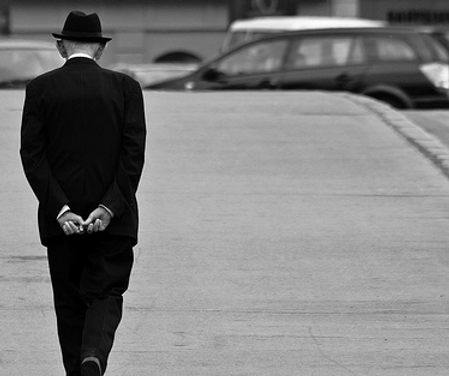


He was found by the Bureau of Statistics to be
One against whom there was no official complaint,
And all the reports on his conduct agree
That, in the modern sense of an old-fashioned word, he was a saint,
For in everything he did he served the Greater Community.
Except for the War till the day he retired
He worked in a factory and never got fired,
But satisfied his employers, Fudge Motors Inc.
Yet he wasn't a scab or odd in his views,
For his Union reports that he paid his dues,
(Our report on his Union shows it was sound)
And our Social Psychology workers found
That he was popular with his mates and liked a drink.
The Press are convinced that he bought a paper every day
And that his reactions to advertisements were normal in every way.
Policies taken out in his name prove that he was fully insured,
And his Health-card shows he was once in a hospital but left it cured.
Both Producers Research and High-Grade Living declare
He was fully sensible to the advantages of the Instalment Plan
And had everything necessary to the Modern Man,
A phonograph, a radio, a car and a frigidaire.
Our researchers into Public Opinion are content
That he held the proper opinions for the time of year;
When there was peace, he was for peace: when there was war, he went.
He was married and added five children to the population,
Which our Eugenist says was the right number for a parent of his generation.
And our teachers report that he never interfered with their education.
Was he free? Was he happy? The question is absurd:
Had anything been wrong, we should certainly have heard.
Barriers of Soceity
POETRY
“The Unknown Citizen,’’ by W.H Auden
“The Unknown Citizen,’’ a ballad by W.H Auden and describes a man who grew up and went through life pleasing others by doing what they expected of him and at no time did anyone ask if he was happy or free.The poem is formed of 32 verses all in one stanza. There is no defined rhyming pattern, but there are quite a few lines that have the “aabb” rhyming pattern. Throughout the poem, it lists the many activities he performed throughout his life such as working at a factory where he pleased his employers, reacting the same way to the new paper he read everyday, took advantage of the Installment Plan which portrayed him as sensible, owning possessions that every other man had such as a phonograph, a radio and a car, and starting a family with the right number of children in his generation. Most of the poem, talks about the aforementioned events and other similar ones that show him to be a man, who did not stir up any trouble, went with the flow of the world, and was similar to any other man of his generation. The last two verses are the most significant ones that bring out the theme of succumbing to societal expectations. The line, “Was he free? Was he happy? The question is absurd,” illustrates that his opinion was never asked and he never voiced it either. He went through his life and performed activities that everyone else in society also did feeling obliged to go through life doing those things, not reflecting on whether he wants to do those or not.The message the poet is trying to convey is that people may go on with their lives thinking they have to do certain things such as get a job, be insured, start a family, but these are just stages of life one is able to go through, but they are not mandatory. If one wishes to not start a family, then they should make that decision to be true to themselves, as they are not going to find happiness and satisfaction in something that they do not wish to do. Usually, seeing the people around you following these regular stages of life, pressures one to do the same and not make what may seem as the wrong choice by diverting from these regular practices. What one has to remember, are each step they take in their lives opens up to a whole new set of possibilities and even fi the step they take may not end up where they want, it was still an experience from where they can learn and change what they need to end up where they want and do what they want.